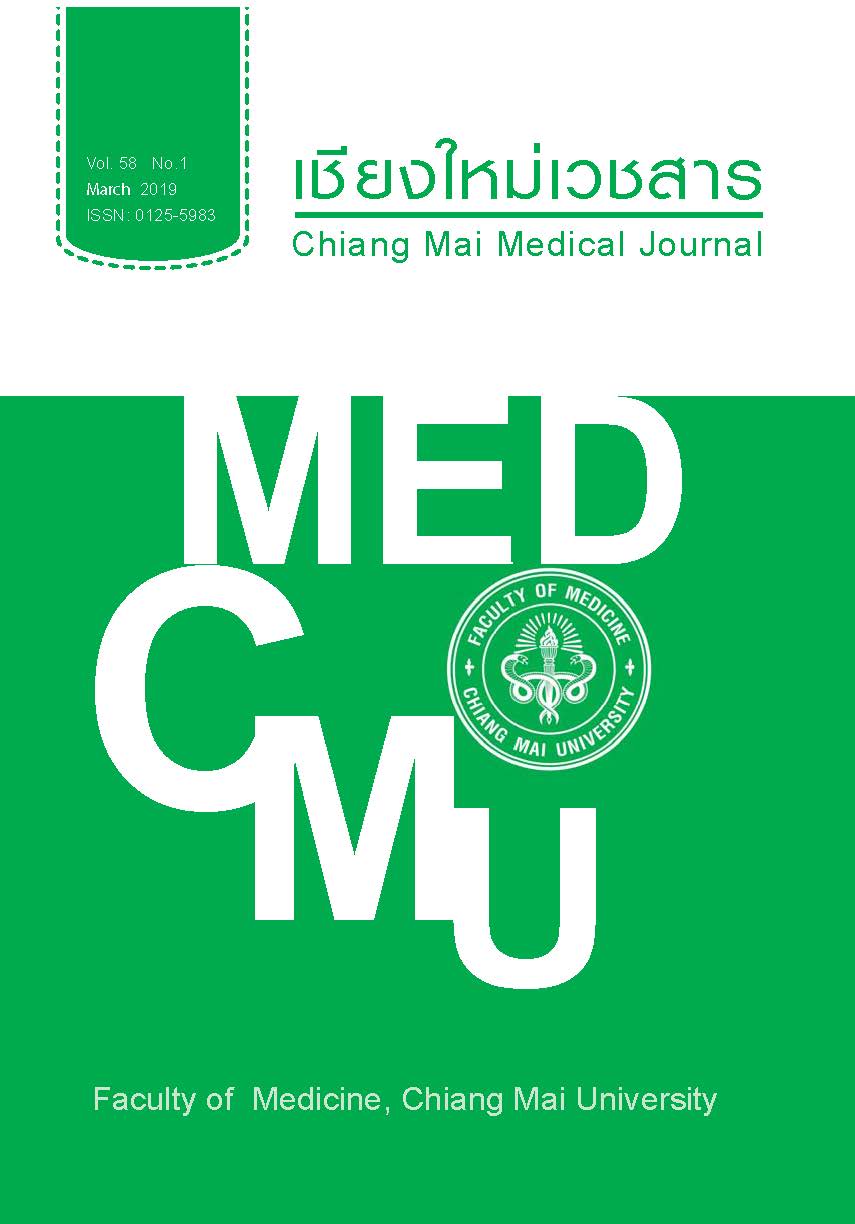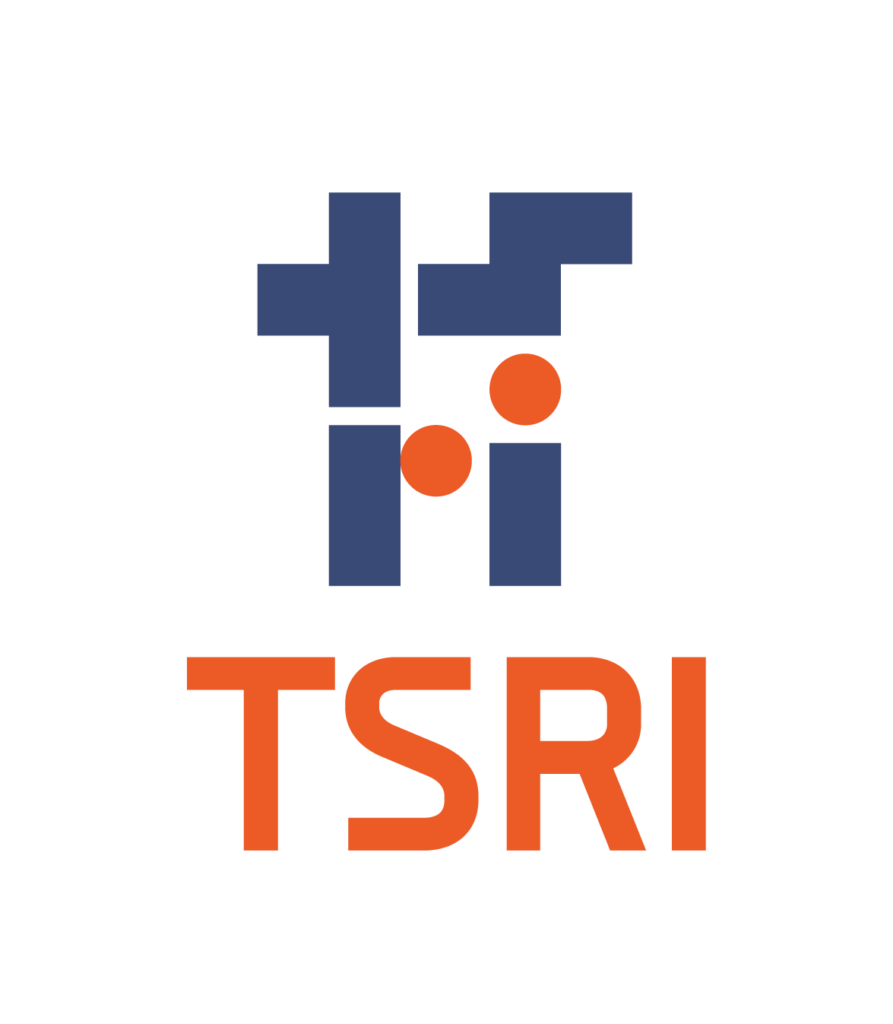The relationship of sleep quality and sleep hygiene with fatigability of resident physicians in a university hospital
Keywords:
Sleep Quality, Sleep Hygiene, Fatigability, Resident PhysiciansAbstract
Objective To evaluate the association of sleep quality and sleep hygiene with fatigability of resident physicians.
Methods A cross-sectional study was conducted using questionnaires to collect data from resident physicians from different departments in the Faculty of Medicine, Chiang Mai University, Thailand. Survey questions included demographic data and information regarding sleep and periods on duty. In addition, the questionnaire sets included the Pittsburg Sleep Quality Index (PSQI), the Sleep Hygiene Index (SHI), and the Stanford Sleepiness Scale (SSS).
Results Of the 429 questionnaires distributed, 223 sets were returned (51.98%). The average hours of sleep per day when an overnight shift, time required to fall asleep, and the number of overnight shifts per month were 6.62 hours, 15.80 minutes, and 9.46 shifts, respectively. During an overnight duty shift, the average number of times a resident was awakened and the length of the actual sleep period were 3.67 times and 4.12 hours, respectively. The average scores of PSQI, SHI, and SSS while not on a shift and SSS while on a shift were 5.06±2.66, 30.96±8.27, 2.12±1.29, and 3.71±1.74, respectively. Significant relationships between sleep quality, sleep hygiene, and fatigability both before and after a shift were identified (p<0.05). Sleep quality and sleep hygiene had a significant effect on the fatigability of the resident physicians (SSS) after a period of being on duty. Each 1 point increase in PSQI resulted in a 0.25 point increase in SSS (95%CI 0.13-0.31, p<0.01). Similarly, a 1 point increase in SHI was accompanied by a 0.1 increase in SSS (95%CI 0.02-0.8, p<0.01).
Hours of sleep per day when not working on a shift, the number of overnight shifts worked each month, and the number of hours worked per shift were found to have no relationship with sleep quality, sleep hygiene, or fatigability. Nevertheless, the number of incidents of being awakened and the average actual sleep time were significantly associated with sleep quality, sleep hygiene, and fatigability after shift work (p<0.05).
Conclusion Sleep quality and sleep hygiene, both before and after an overnight duty shift, are significantly related with fatigability. Resident physicians who have both good sleep quality and good sleep hygiene have reduced fatigability.
References
2. Honkus VL. Sleep deprivation in critical care units. Crit Care Nurs Q. 2003;26:179-89; quiz 90-1.
3. Herscovici S, Pe’er A, Papyan S, Lavie P. Detecting REM sleep from the finger: an automatic REM sleep algorithm based on peripheral arterial tone (PAT) and actigraphy. Physiol Meas. 2007;28:129-40.
4. Pilcher JJ, Ginter DR, Sadowsky B. Sleep quality versus sleep quantity: relationships between sleep and measures of health, well-being and sleepiness in college students. J Psychosom Res. 1997;42:583-96.
5. Hill CM, Hogan AM, Karmiloff-Smith A. To sleep, perchance to enrich learning? Arch Dis Child. 2007;92:637-43.
6. Mastin DF, Bryson J, Corwyn R. Assessment of sleep hygiene using the Sleep Hygiene Index. J Behav Med. 2006;29:223-7.
7. Brown FC, Buboltz WC, Jr., Soper B. Relationship of sleep hygiene awareness, sleep hygiene practices, and sleep quality in university students. Behav Med. 2002;28:33-8.
8. Gellis LA, Lichstein KL. Sleep hygiene practices of good and poor sleepers in the United States: an internet-based study. Behav Ther. 2009;40:1-9.
9. LeBourgeois MK, Giannotti F, Cortesi F, Wolfson AR, Harsh J. The relationship between reported sleep quality and sleep hygiene in Italian and American adolescents. Pediatrics. 2005;115(1 Suppl):257-65.
10. LeBourgeois MK, Giannotti F, Cortesi F, Wolfson A, Harsh J. Sleep hygiene and sleep quality in Italian and American adolescents. Ann N Y Acad Sci. 2004;1021: 352-4.
11. Brown FC, Buboltz WC, Jr., Soper B. Development and evaluation of the Sleep Treatment and Education Program for Students (STEPS). J Am Coll Health. 2006;54: 231-7.
12. Yang CM, Wu CH, Hsieh MH, Liu MH, Lu FH. Coping with sleep disturbances among young adults: a survey of first-year college students in Taiwan. Behav Med. 2003;29:133-8.
13. Deaconson TF, O’Hair DP, Levy MF, Lee MB, Schueneman AL, Codon RE. Sleep deprivation and resident performance. JAMA. 1988;260:1721-7.
14. Dinges DF, Pack F, Williams K, Gillen KA, Powell JW, Ott GE, et al. Cumulative sleepiness, mood disturbance, and psychomotor vigilance performance decrements during a week of sleep restricted to 4-5 hours per night. Sleep. 1997;20:267-77.
15. Deary IJ, Tait R. Effects of sleep disruption on cognitive performance and mood in medical house officers. Br Med J (Clin Res Ed). 1987;295(6612):1513-6.
16. Barger LK, Cade BE, Ayas NT, Cronin JW, Rosner B, Speizer FE, et al. Extended work shifts and the risk of motor vehicle crashes among interns. N Engl J Med. 2005;352:125-34.
17. Leonard C, Fanning N, Attwood J, Buckley M. The effect of fatigue, sleep deprivation and onerous working hours on the physical and mental wellbeing of pre-registration house officers. Ir J Med Sci. 1998;167:22-5.
18. Berkoff K, Rusin W. Pediatric house staff’s psychological response to call duty. J Dev Behav Pediatr. 1991;12:6-10.
19. Landau C, Hall S, Wartman SA, Macko MB. Stresses and supports during residency training. Res Med Educ. 1984;23:44-9.
20. Landau C, Hall S, Wartman SA, Macko MB. Stress in social and family relationships during the medical residency. J Med Educ. 1986;61:654-60.
21. Stone MD, Doyle J, Bosch RJ, Bothe A, Jr., Steele G, Jr. Effect of resident call status on ABSITE performance. American Board of Surgery In-Training Examination. Surgery. 2000;128:465-71.
22. Godellas CV, Huang R. Factors affecting performance on the American Board of Surgery in-training examination. Am J Surg. 2001;181:294-6.
23. Jacques CH, Lynch JC, Samkoff JS. The effects of sleep loss on cognitive performance of resident physicians. J Fam Pract. 1990;30:223-9.
24. Taffinder NJ, McManus IC, Gul Y, Russell RC, Darzi A. Effect of sleep deprivation on surgeons’ dexterity on laparoscopy simulator. Lancet. 1998;352(9135):1191.
25. Lingenfelser T, Kaschel R, Weber A, Zaiser-Kaschel H, Jakober B, Kuper J. Young hospital doctors after night duty: their task-specific cognitive status and emotional condition. Med Educ. 1994;28:566-72.
26. Samkoff JS, Jacques CH. A review of studies concerning effects of sleep deprivation and fatigue on residents’ performance. Acad Med. 1991;66:687-93.
27. Saxena AD, George CF. Sleep and motor performance in on-call internal medicine residents. Sleep. 2005;28: 1386-91.
28. Weinstein DF. Duty hours for resident physicians--tough choices for teaching hospitals. N Engl J Med. 2002;347:1275-8.
29. Richert AC, Baran AS. A review of common sleep disorders. CNS Spectr. 2003;8:102-9.
30. Roldan G, Ang RC. Overview of sleep disorders. Respir Care Clin N Am. 2006;12:31-54, viii.
31. Buysse DJ, Reynolds CF, 3rd, Monk TH, Berman SR, Kupfer DJ. The Pittsburgh Sleep Quality Index: a new instrument for psychiatric practice and research. Psychiatry Res. 1989;28:193-213.
32. Saletu B, Gruber G, Mandl M, Becker B, Ben-Chur R, Damianisch K, et al. [Clinical diagnosis in sleep laboratory patients based on ICD-10, DSM-III-R and ICSD classification criteria]. Wien Med Wochenschr. 1995; 145:656-62.
33. Hoddes E, Zarcone V, Smythe H, Phillips R, Dement WC. Quantification of sleepiness: a new approach. Psychophysiology. 1973;10:431-6.
Downloads
Published
How to Cite
Issue
Section
License

This work is licensed under a Creative Commons Attribution-NonCommercial-NoDerivatives 4.0 International License.










